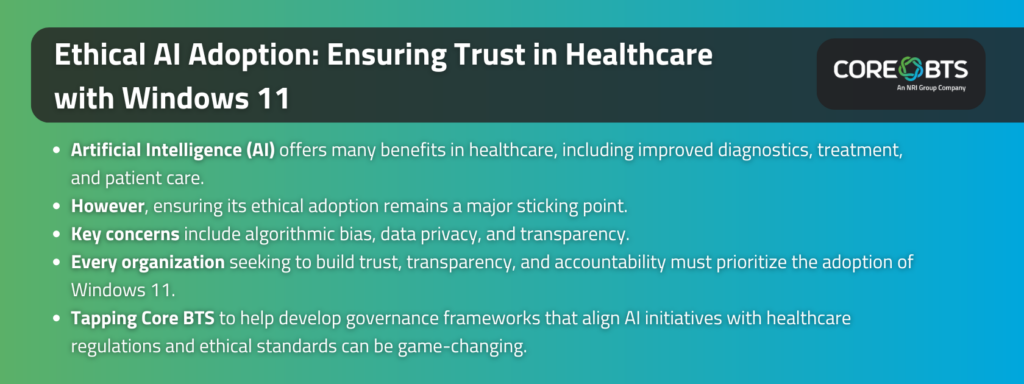Healthcare providers must balance AI adoption with ethical practices to realize its full promise. With Windows 11 and Core BTS’s help, discover how to stay ahead of the curve.

Artificial intelligence (AI) is changing the face of healthcare as we know it. However, alongside immense potential lies the challenge of ensuring responsible AI adoption.
This guide explores the ethical considerations for implementing AI and offers strategies to foster trust, transparency, and accountability. Additionally, it provides insights on leveraging Windows 11 and Core BTS to bridge the technological gap. Let’s dive in and discover how to navigate these important aspects.
AI’s Transformative Power in Healthcare: A Balancing Act
The AI healthcare market is valued at $20.9 billion in 2024 and will grow at a compound annual growth rate (CAGR) of 48.1%, hitting $148.4 billion in 2029. Forecasted growth aside, AI already demonstrates its potential to change healthcare, even in these early stages.
Promising applications include diagnosis, personalized treatment, and patient care.
- Diagnosis: AI-powered medical imaging enhances anomaly detection in CT scans, MRIs, and X-rays, helping doctors accelerate treatment. Per Harvard’s School of Public Health, using AI in diagnosis improves health outcomes by up to 40%.
- Personalized treatment: AI sifts through huge chunks of data, including patients’ lifestyle, medical, and genetic information, before offering recommendations. This holistic analysis helps caregivers deliver tailored treatment plans with optimum drug selection and dosages.
- Patient care: AI chatbots and virtual assistants allow patients to access the answers they need without the wait. At the same time, healthcare providers keep their attention where it needs to be—delivering treatment.
Currently, no standard guidelines, processes, or rules govern how healthcare models are designed and used. Yet it’s clear that balancing AI adoption with ethical considerations is critical to continuing to reap the benefits.
Without an ethics-first approach, several significant issues may arise:
- Algorithmic bias: Skewed training data may embed real-world biases into AI algorithms, resulting in unequal treatment, underdiagnosis, or misdiagnosis of specific demographic groups.
- Breach of data privacy and security: Training AI models on patients’ sensitive information without consent for such use violates their rights. If the models lack robust security protections, it may not be too long before data falls into the hands of nefarious actors.
- Lack of transparency: Limited visibility into how algorithms work makes examining or explaining the logic behind AI-driven decisions challenging.
Building Trustworthy AI: Transparency and Accountability
Transparency, explainability, and human oversight are essential for responsible AI use. Healthcare organizations should never forget that AI’s role is to enhance medical practitioners’ work rather than replace them.
To this end, they must establish high standards to manage AI’s impacts on patients and society.
Training data should be vetted and standardized to prevent real-world biases. There must also be openness and clarity about how AI algorithms work to hold systems accountable and ensure ethical and fair decisions.
At the same time, clinicians must communicate the impact and limitations of AI use in diagnosis and treatment for informed patient consent. Traditional medical alternatives should be readily available for those who opt out of AI-based care.
Windows 11: A Platform for Fostering Responsible AI
Windows 11 can be your ally for fostering responsible AI use. It packs several impressive features, including:
- Enhanced security: Windows 11 is built around zero-trust principles and delivers robust security when handling mission-critical operations with AI. Top protections include secure boot with Trusted Platform Module (TPM) 2.0, device health attestation, end-to-end encryption, virtualization-based security (VBS), and role-based access controls.
- Improved audit logging: Windows 11 maintains a comprehensive audit trail for AI applications. It automatically captures and analyzes details about access events and configuration changes, including the individual, time, and outcomes associated with each activity. This fosters accountability and helps mitigate potential security threats in real time.
- Better privacy: Windows 11 built-in privacy controls allow healthcare organizations to manage permissions better and protect users’ data when using AI applications.
Windows 11 is suitable for responsible AI and can help you navigate the often complex regulations in healthcare.
Navigating the Ethical Landscape: Regulations and Standards
Understanding key regulations and ethical standards governing AI use in healthcare is crucial to avoid trouble. Currently, HIPAA (Health Insurance Portability and Accountability Act) and the EU AI Act are the most prominent: HIPAA exists to safeguard sensitive patient information, while the EU AI Act promotes explainability and risk management in AI systems.
Windows 11 aids compliance with both regulations.
- HIPAA: Windows 11’s built-in encryption tools ensure data remains secure in transit and at rest. Further, its robust authentication and access control mechanisms minimize the risk of unauthorized access to patients’ health information.
- EU AI Act Compliance: Windows 11’s advanced capabilities allow developers to build applications with explainability features. And with real-time logging and monitoring, risk management is a breeze.
As you embark on your journey of ethical AI use with Windows 11, robust governance frameworks are crucial. That’s where Core BTS comes in.
Core BTS: Your Partner in Ethical AI Governance
At Core BTS, we firmly believe that AI and business strategy are two sides of the same coin. This mindset has guided us when implementing AI governance frameworks for all our clients. Partnering with Core BTS means laying a secure, ethical, and future-proof AI foundation for your healthcare organizations.
Get started with a free AI readiness assessment and chart your way forward with the Core BTS advantage.



